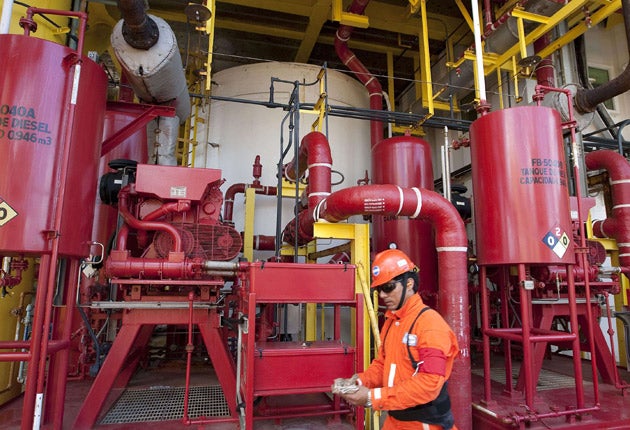A competitive field: The improved perception of the oil, gas and mining industry is luring graduates

Your support helps us to tell the story
From reproductive rights to climate change to Big Tech, The Independent is on the ground when the story is developing. Whether it's investigating the financials of Elon Musk's pro-Trump PAC or producing our latest documentary, 'The A Word', which shines a light on the American women fighting for reproductive rights, we know how important it is to parse out the facts from the messaging.
At such a critical moment in US history, we need reporters on the ground. Your donation allows us to keep sending journalists to speak to both sides of the story.
The Independent is trusted by Americans across the entire political spectrum. And unlike many other quality news outlets, we choose not to lock Americans out of our reporting and analysis with paywalls. We believe quality journalism should be available to everyone, paid for by those who can afford it.
Your support makes all the difference.Times are changing. In the past, students have smeared themselves in oil and lain down before oil company stands at careers fairs in protest at corporate ethics. Now, many are coming to the big multinationals, more interested in a job. The numbers of graduates attending recruitment fairs for the science and engineering sector are higher than ever this year, according to the University of Oxford. "This is partly the economic situation, partly because the perception of the [oil, gas and mining] industry has changed for the better," says Jonathan Black, director of the careers service at the University of Oxford.
While, as one recruiter for the oil industry put it, "there's nothing environmentally friendly about drilling a hole in the earth", awareness of safety and the environmental, social and economic impact of operations arguably has never been higher in the wake of the Deepwater Horizon disaster in the Gulf of Mexico in April. Industries formerly shunned by environmentalists are now some of the biggest recruiters of environmental scientists. And those with the skills to tackle environmental challenges of this type will be in short supply, a report this month has warned. "Environmental science is a competitive sector," agrees Professor Robert Allison, pro-vice-chancellor at the University of Sussex. "But we have some critical gaps – people with high-level fieldwork skills, and those trained to understand risk and uncertainty in this context, as well as specific skills in freshwater and soil science."
Regulatory bodies lament the lack of people qualified in particular to translate research, said the report conducted by the Natural Environment Research Council (Nerc). There's a dearth of scientists qualified to conduct field research and analyse complex information such as environmental impact assessments – which oil, gas and mining companies are obliged to conduct.
"There's an increasing role for stewardship and management of the environment, either with the oil companies themselves or the regulators," says Allison, who helped launch the report. "You need, for instance, baseline ecological surveys to understand the starting point of any project and what intervention might be necessary to return an environment to its natural state, and measure whether the intervention is working." Relevant Masters and doctoral qualifications are desirable for this level of research.
Niche environmental consultancies which advise oil multinationals embarking upon projects or cleaning them up are an attractive source of employment for environmental scientists, but only the larger firms will take graduate-level entrants. Better to get several years' front-line experience within the oil and gas industry, they advise, before making the leap to consulting. "Experience is crucial," says Dr Paul Mitchell, director of Green Horizons consultants. His background in the mining industry has led him to conduct impact assessments on the commodity mines of West Africa. "Try to work in as many different company departments as possible. There's a wealth of knowledge you just don't get from books. While regulations are fairly consistent globally, whether countries enforce them is another matter. A load of secondary impacts (from oil and mining projects) can crop up. Larger companies often go above and beyond what's required of them."
Another route into this field might be via larger generalist consultancies that recruit graduates; seek out specialist offices in oil and gas within these firms and carve a niche, say careers advisers. And all major oil and gas companies invest in renewable energy, although this remains a fraction of their overall business. Some, such as BP and Shell, have a sizeable stake in onshore wind energy in the United States, but investment in renewables is dominated by larger energy companies.
Meanwhile, Jenny Clucas, chief executive of Chemicals Northwest, says: "There's a vast array of jobs related to the environment within the chemical sector. More will appear in the next decade as the industry becomes increasingly green." From research and working with regulators to environment management and analysis, the disciplines and skills required are hugely varied.
So the message from industry, academics and career experts is if you want to influence environmental policy and industrial practice, work from within the industry. "The impact you can have is substantial," says Mitchell. "Mining, oil and gas won't go away. You can get in at ground level, and with enough experience get involved on the policy side. Environmentally and socially, it's a worthwhile cause."
Join our commenting forum
Join thought-provoking conversations, follow other Independent readers and see their replies
Comments